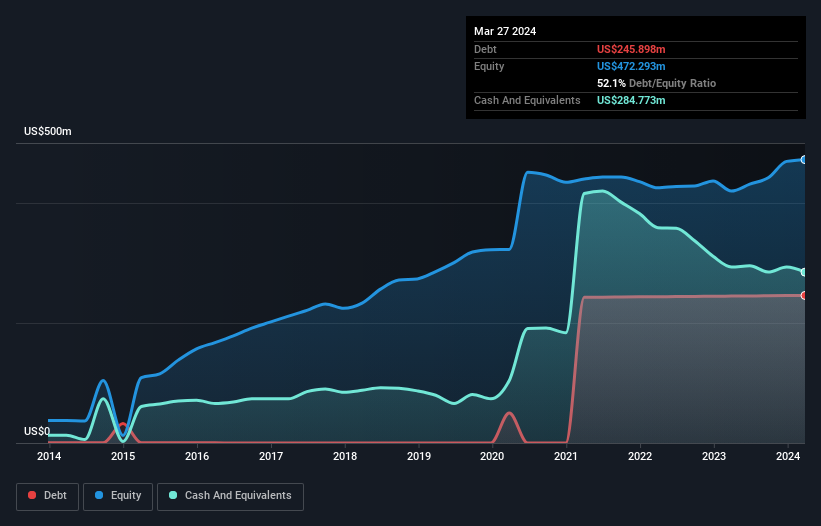Legendary fund manager Li Lu (who Charlie Munger backed) once said, 'The biggest investment risk is not the volatility of prices, but whether you will suffer a permanent loss of capital.' So it might be obvious that you need to consider debt, when you think about how risky any given stock is, because too much debt can sink a company. We can see that Shake Shack Inc. (NYSE:SHAK) does use debt in its business. But is this debt a concern to shareholders?
When Is Debt A Problem?
Debt is a tool to help businesses grow, but if a business is incapable of paying off its lenders, then it exists at their mercy. If things get really bad, the lenders can take control of the business. While that is not too common, we often do see indebted companies permanently diluting shareholders because lenders force them to raise capital at a distressed price. Of course, plenty of companies use debt to fund growth, without any negative consequences. When we examine debt levels, we first consider both cash and debt levels, together.
See our latest analysis for Shake Shack
How Much Debt Does Shake Shack Carry?
The chart below, which you can click on for greater detail, shows that Shake Shack had US$245.9m in debt in March 2024; about the same as the year before. But on the other hand it also has US$284.8m in cash, leading to a US$38.9m net cash position.

How Healthy Is Shake Shack's Balance Sheet?
Zooming in on the latest balance sheet data, we can see that Shake Shack had liabilities of US$161.1m due within 12 months and liabilities of US$985.5m due beyond that. Offsetting these obligations, it had cash of US$284.8m as well as receivables valued at US$26.8m due within 12 months. So its liabilities total US$835.0m more than the combination of its cash and short-term receivables.
While this might seem like a lot, it is not so bad since Shake Shack has a market capitalization of US$3.63b, and so it could probably strengthen its balance sheet by raising capital if it needed to. But we definitely want to keep our eyes open to indications that its debt is bringing too much risk. Despite its noteworthy liabilities, Shake Shack boasts net cash, so it's fair to say it does not have a heavy debt load!
It was also good to see that despite losing money on the EBIT line last year, Shake Shack turned things around in the last 12 months, delivering and EBIT of US$14m. When analysing debt levels, the balance sheet is the obvious place to start. But ultimately the future profitability of the business will decide if Shake Shack can strengthen its balance sheet over time. So if you want to see what the professionals think, you might find this free report on analyst profit forecasts to be interesting.
But our final consideration is also important, because a company cannot pay debt with paper profits; it needs cold hard cash. While Shake Shack has net cash on its balance sheet, it's still worth taking a look at its ability to convert earnings before interest and tax (EBIT) to free cash flow, to help us understand how quickly it is building (or eroding) that cash balance. Considering the last year, Shake Shack actually recorded a cash outflow, overall. Debt is far more risky for companies with unreliable free cash flow, so shareholders should be hoping that the past expenditure will produce free cash flow in the future.
Summing Up
While Shake Shack does have more liabilities than liquid assets, it also has net cash of US$38.9m. So we are not troubled with Shake Shack's debt use. The balance sheet is clearly the area to focus on when you are analysing debt. But ultimately, every company can contain risks that exist outside of the balance sheet. We've identified 1 warning sign with Shake Shack , and understanding them should be part of your investment process.
Of course, if you're the type of investor who prefers buying stocks without the burden of debt, then don't hesitate to discover our exclusive list of net cash growth stocks, today.
New: Manage All Your Stock Portfolios in One Place
We've created the ultimate portfolio companion for stock investors, and it's free.
• Connect an unlimited number of Portfolios and see your total in one currency
• Be alerted to new Warning Signs or Risks via email or mobile
• Track the Fair Value of your stocks
Have feedback on this article? Concerned about the content? Get in touch with us directly. Alternatively, email editorial-team (at) simplywallst.com.
This article by Simply Wall St is general in nature. We provide commentary based on historical data and analyst forecasts only using an unbiased methodology and our articles are not intended to be financial advice. It does not constitute a recommendation to buy or sell any stock, and does not take account of your objectives, or your financial situation. We aim to bring you long-term focused analysis driven by fundamental data. Note that our analysis may not factor in the latest price-sensitive company announcements or qualitative material. Simply Wall St has no position in any stocks mentioned.
Have feedback on this article? Concerned about the content? Get in touch with us directly. Alternatively, email editorial-team@simplywallst.com
About NYSE:SHAK
Shake Shack
Owns, operates, and licenses Shake Shack restaurants (Shacks) in the United States and internationally.
Solid track record with reasonable growth potential.
Market Insights
Community Narratives



